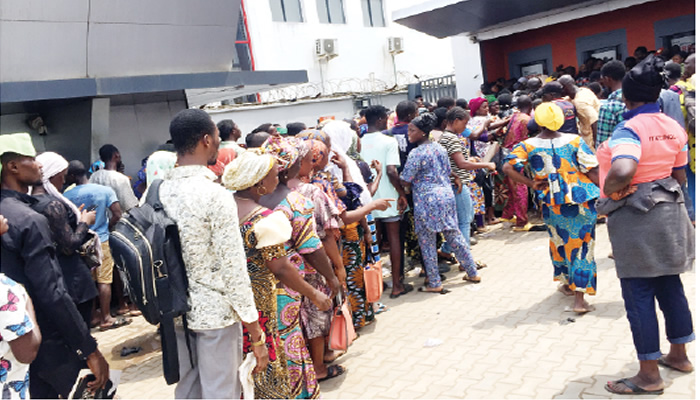
Families are still facing tough times as the Central Bank of Nigeria and the President, Major General Muhammadu (retd.), refuse to obey the Supreme Court orders on the new naira notes, OLUWAKEMI ABIMBOLA writes
Mother of two, Mrs Chibuzor Anyaeji, has resorted to sending naira notes to her son and her mother who are in her hometown, Nnewi, Anambra State via interstate transport companies in the last few weeks because there is no other way for them to get money to buy the necessities of life that they need.
Anyaeji, a trader, who sells lubricants at First Gate Bus Stop along Lagos-Badagry Expressway, lamented that the naira crunch has left her unable to meet her financial obligations to her family.
She said that the Supreme Court ruling on Friday, which extended the deadline for the use of old Naira notes as legal tender till December, provided no relief for her and her family.
The Supreme Court led by Justice Emmanuel Agim nullified the Federal Government’s naira redesign policy, saying that it contravened the 1999 Constitution. The apex court also argued that the President, Major General Muhammadu Buhari (retd.), usurped the powers of the Central Bank of Nigeria when he issued the directive banning the old naira notes of N1,000, N500 and N200 notes from February 10, 2023.
Sharing her experience on Wednesday, Anyaeji, lamented that apart from not being able to give her daughter money to go to school, she had to use money to send cash to her mother and son.
She said, “This morning, my daughter cried to school because I didn’t have the cash to give her. I usually give her N300 or N400 daily, but today, I had no cash on me to give her. And she has a leg problem that takes us to LUTH for treatment, so she shouldn’t be walking long a distance but I had no choice today. I didn’t have cash. I even asked her to stay back at home but she said that they had a test at school, so she had to go.”
About sending money to her aged mother and son, a university student, who was in the village due to the closure of schools for the election, the trader said, “My first son, who is with my mum in the village has been asking for money but if I send the money, there is no way for them to get cash. Things are worse over there than here. They can be asked to pay N500 to collect N1000. I had to resort to ‘way billing’ money to him and my mum. Any small cash that I get from my business, I would send via this interstate driver, who is from my village and he will help me drop it.”
Another trader, who sells clothes, Samuel Ama, said ‘way billing’ of cash was the way to go for those who wanted to send money to their loved ones.
Ama revealed that some conceal the cash inside a loaf of bread or inside tubers of yam, to discourage possible theft by the transporters.
On collecting the old notes as ruled by the Supreme Court, Ama said he was not going to collect the old notes until either Buhari or the Governor of the Central Bank of Nigeria, Godwin Emefiele, speaks.
“We are waiting for Buhari and Emefiele to talk,” he said.
A trader at the Articles Dealers Shopping Complex opposite Trade Fair along the Lagos-Badagry Expressway, Mrs Vivian Ikebido, broke down in tears while speaking with our correspondent.
She lamented that she’s losing money every day due to the Naira crunch and even proposed a shutdown of the economy, pending when the stakeholders get a handle on the situation.
Ikebido, who sells diapers and related items recounted her latest encounter with a new customer, who bought goods worth over N50,000 since Monday. She had no cash and attempts to make transfers were unsuccessful. The trader said she was reluctant to let the woman go with her goods but when the woman swore with her life that she would indeed transfer her money, she obliged.
“I’m in a hellfire now. I’m losing money, I’m losing customers. This woman who came from Badagry on Monday swore with her life that she will transfer my money but for two days now, I have not seen my money. Over N50,000 and her number is longer going through. I called the number throughout the night and till this money, it’s not going through.”
“I have not been able to sleep,” Ikebido said as she wiped tears from her eyes with her Ankara wrapper, “I work too hard for this kind of thing to be happening to me. If I have any small money, I will close down, go and rest, I can’t deal with this anymore. I will come back when things have stabilised.”
“If possible, they can shut down, pending when they sort this thing out and reopen when things are better,” she added.
Ikebido also claimed that over N250,000 of her trading money is in the hands of her customers, who didn’t have cash when they came to buy from her or who claimed to have transferred to her but she never saw the credit alert.
Family responsibilities
An IT expert, Baker James, lamented how the naira crunch has left him unable to meet his family’s needs.
James, who spoke with her correspondent at Oshodi, Lagos said, “For the past four days, I have had no cash, that even to eat is a problem, to pay for transportation, to buy food in the house is a problem.
“Money is the major driver of productivity in any country and when you withdraw money from circulation, you strangulate the economy.”
Dismissing the Supreme Court ruling on the policy, Baker said, “It hasn’t yielded any result because the masses are waiting on the president to make a pronouncement on the matter. The President has placed himself as being above the law.”
Corroborating the claims made by James, a trader and father of two, Ikenna Dike, said that the Naira crunch meant days spent at home because he didn’t have the cash to transport himself to his business place.
He added that he had also resorted to bringing food to his shop from home because he can no longer afford to buy food outside.
Dike said, “These days, I don’t even have money to give my children to take to school. It’s even hard to get money to prepare food for them. During the last election, I was at home for four days because I didn’t have money to come to the ‘market.’
“Before now, I used to eat at home but nowadays, I bring my food to the ‘market’. I don’t have money to pay the Point of Sale operator and then pay the food seller, who will also demand bank charges.”
For an auto electrician, Fatai Alabi, his saving grace during this period is that his wife also works.
He said, “I work but I don’t see the money. Customers have gone away with my money. Honestly, it helps that my wife also works during this period. The fact that she has handiwork has helped a lot in this situation.”
Lamenting the level of exploitation by PoS operators, Mrs Mariam Abidoye, who sells skincare products, said that the masses were literally at the mercy of the operators because there were no other means of getting cash.
Abidoye said, “The exploitation is much. Only big shops can afford to get their own PoS, but the small businesses expect you to pay their charges to withdraw the money. In this market, traders who sell perishable food items refuse to collect transfers, so you have to use the PoS operators. Meanwhile, the PoS operators claim that they are also buying the cash and must gain. It’s sad.”
Highlighting the issue of the lack of trust between customers and business owners, which has worsened during this time, Mrs Abidoye said that she had to wait for four hours for a pharmacist, when her son fell ill recently because the salesperson at the pharmacy insisted that only the owner could authorise her to collect payment via bank transfer.
She said, “I had to wait for four hours with my ailing son to see the pharmacy owner, to plead with him to accept the transfer because the salesgirl didn’t accept it. And I understand the reluctance because I have experienced the same.”
Bookseller, Paul Nwosu, at Oshodi claimed that the Naira crunch was so bad that he had not been making up to 10 per cent of what he used to make in terms of sales.
He said, “The Naira scarcity is choking. Very few people are buying books. I make less than 10 per cent of what I used to make. I have not been able to meet my family’s expenses. My business is running down.”
Motorists, traders
At the Mile 2 bus stop on Wednesday, a Polaris Bank customer was nearly stranded as the bus conductor rejected the old N1000 naira note he had.
“I just collected this money from the Polaris Bank at First Gate. They are paying with old notes,” he told the bus conductor, who also showed him the old N500 note he had in his pocket, which he had been unable to spend. It took the intervention of the bus driver to allow the passenger on the bus.
Another bus conductor, Friday Tunde, revealed that the owner of the bus rejected all the old notes that they took to him over the weekend.
Tunde, who plies the Mile 2-Oshodi-Mile 12 route said, “We took N180,000 to the owner, all the old notes in the money worth N20,000 were removed and returned to us. The owner rejected the money. I cannot collect it oh.”
Condiment seller, Joy Madubuchi, also said that she would not be collecting the old notes but for a different reason.
She said that she went through a lot of hassles to deposit the old naira notes she had with her after the expiration of the CBN deadline.
“I had a hard time depositing the old notes. I will never collect the old notes again,” she said.





